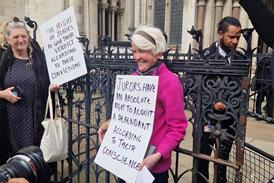Decisions filed recently with the Law Society (which may be subject to appeal)
Margaret Bridget Hetherington and Patrick Clement Hetherington
Application 12175-2021
Hearing 2-9 August 2021
Reasons 27 September 2021
The Solicitors Disciplinary Tribunal ordered that the first respondent (admitted 1994) and the second respondent (admitted 1986) (siblings) should each be struck off the roll.
The first respondent, while in practice as a partner in and director of the Hetherington Partnership Limited, having accepted instructions to act for purchaser clients in transactions, namely purchases of parking spaces or storage pods from companies linked to an entity named Group First (the schemes), had failed to give her clients adequate advice as to the proposed transactions and had failed to act in her clients’ best interests, thereby breaching rules 1.02, 1.04 and 1.06 of the Solicitors Code of Conduct 2007 and principles 2, 4 and 6 of the SRA Principles 2011. She had acted dishonestly.
In acting for purchaser clients in respect of the schemes as set out above, she had preferred her own interests over the interests of clients, thereby breaching rules 1.02, 1.03, 1.06 and 3.01 of the code, and principles 2, 3 and 6 of the principles, and had acted in a situation giving rise to an ‘own interest’ conflict, thereby breaching rule 3.01 of the 2007 code and failing to achieve outcome 3.4 of the SRA Code of Conduct 2011. She had acted dishonestly.
The second respondent, while in practice as a partner in, and the compliance officer for legal practice (COLP), compliance officer for finance and administration (COFA) and money laundering reporting officer (MLRO) of, the firm, had failed to cause the firm to give clients adequate advice as to the proposed transactions or to act in clients’ best interests, thereby breaching rules 1.02, 1.04 and 1.06 of the 2007 code and principles 2, 4, and 6 of the Principles. He had acted dishonestly.
In allowing the firm to act for purchaser clients in respect of the schemes as set out above, he had preferred his own and the firm’s interests over the interests of clients, thereby breaching rules 1.02, 1.03, 1.06 and 3.01 of the 2007 code, and principles 2, 3 and 6 of the principles, and had allowed the firm to act in a situation giving rise to an ‘own interest’ conflict, thereby breaching rule 3.01 of the 2007 code and failing to achieve outcome 3.4 of the SRA Code of Conduct 2011. He had acted dishonestly.
Further, the second respondent, by reason of the facts and matters set out above, had failed to ensure, or failed to take adequate steps to ensure, compliance with the firm’s obligations, breaching his obligations as the COLP of the firm under rule 8.5(c) of the SRA Authorisation Rules 2011 and as the COFA of the firm under rule 8.5(e) of those rules.
The respondents’ conduct was deliberate, calculated and repeated over a number of years and over 6,000 transactions. They had been evasive in their evidence and had deliberately failed to answer straightforward questions put to them in cross-examination.
In view of the serious nature of the misconduct, in that it had involved dishonesty, the only appropriate and proportionate sanction was to strike the respondents from the roll.
The respondents were ordered to pay costs of £98,000 on a joint and several basis.
Nina Koushi
Application 12183-2021
Admitted 2019
Hearing 28 July 2021
Reasons 18 August 2021
The SDT ordered that the respondent should be suspended from practice for six months from 28 July 2021.
The respondent had parked her car in a disabled parking space and had displayed a disabled person’s badge on her dashboard. She had pleaded guilty in the magistrates’ court to an offence under section 115 of the Road Traffic Regulation Act 1984, namely that she had used a disabled person’s badge with intent to deceive. In doing so, she had breached principles 2 and 6 of the SRA Principles 2011.
The parties had invited the SDT to deal with the allegations against the respondent in accordance with a statement of agreed facts and proposed outcome.
The SDT was satisfied on the balance of probabilities that the respondent’s admissions had been properly made.
The admitted conduct was inevitably very serious as dishonesty was admitted in respect of both allegations. However, the SDT accepted the submissions made by the parties, and set out in the statement of agreed facts and proposed outcome, as to why exceptional circumstances existed such that strike-off, the normal sanction for dishonesty, would be disproportionate in the present case.
The appropriate sanction in the matter was that the respondent should be suspended from practice for a period of six months. The SDT accordingly granted the application for matters to be resolved by way of the agreed outcome.
The respondent was ordered to pay costs of £2,300.
Victor Stockinger
Application 12177-2021
Admitted 1990
Hearing 26-30 July 2021
Reasons 17 September 2021
The SDT ordered that the respondent should be struck off the roll.
The respondent had failed to comply within the stipulated time frames set out in, or at all with, orders made in proceedings in the Central London County Court on 9 February 2017, and in the Wandsworth County Court on 10 January 2019, requiring him to make costs payments to other parties, thereby breaching principle 6 of the SRA Principles 2011 and failing to achieve outcome 5.3 of the SRA Code of Conduct 2011.
On or about 12 June 2019, at a function organised by the Solicitors’ Association of Higher Court Advocates, the respondent had made statements which were racially, ethnically and religiously motivated, in circumstances in which such conduct amounted to a breach of principles 2, 6 and 9.
Between August 2019 and September 2020, he had failed to cooperate with the investigation conducted by and on behalf of the applicant in that he had:
(i) provided inaccurate and misleading information to an officer of the applicant which he knew or ought to have known was inaccurate and misleading, in that he stated that he had applied for a stay in civil proceedings when he had not done so, thereby breaching principle 7 and failing to achieve outcome 1.06 of the code;
(ii) provided inaccurate and misleading information to an officer of the applicant which he knew or ought to have known was inaccurate and misleading in that he stated that he had appealed an order in civil proceedings when he had not done so, thereby breaching paragraphs 7.3 and 7.4 of the Code of Conduct for Solicitors 2019, and acting dishonestly;
(iii) provided information to an officer of the applicant which he knew or ought to have known was inaccurate and misleading in that he stated that ‘the retired Metropolitan Police inspector who introduced me to [client B] has been active in mediating a settlement with [client B], and he has acknowledged developments as part of this. I have therefore responded to [client B] through him…’ when that was not correct and there had been no such request for or communication about any mediation or settlement, thereby breaching principles 2 and 7 and failing to achieve outcome 10.6, and acting recklessly;
(iv) failed to reply promptly or at all to requests for information made by or on behalf of the applicant, including notices served under section 44B of the Solicitors Act 1974, thereby breaching principle 7 and failing to achieve outcomes 10.6, 10.8 and 10.9; and
(v) failed to provide a complete response to requests for information made by or on behalf of the applicant, including notices served under section 44B of the Solicitors Act 1974, thereby breaching paragraphs 7.3 and 7.4 of the SRA Code of Conduct for Solicitors 2019.
Cumulatively, the conduct found proved against the respondent was of the highest level of seriousness and the protection of the reputation of the legal profession required that the appropriate sanction was strike-off from the roll.
The respondent was ordered to pay costs of £41,850.
Ajijun Maya Ali
Application 12196-2021
Hearing 17 September 2021
Reasons 23 September 2021
The SDT ordered that the respondent should pay a fine of £10,000.
When acting for client A on the assignment of a lease, the respondent had failed to carry out adequate due diligence in respect of the lease; person B’s identity; or the source of funds received by the firm, thereby breaching principles 4, 5 and 6 of the SRA Principles 2011, and failing to achieve outcomes 7.3 and 7.5 of the SRA Code of Conduct 2011.
She had failed to advise client A adequately in respect of the nature of and obligations under the lease, thereby breaching principles 4, 5 and 6.
When acting in litigation in relation to the recovery of funds in a failed property development, the respondent had accepted instructions for the firm to act for clients 1-8 (the clients), and had thereafter acted for and taken steps on their behalf in that litigation, including withdrawing money from client account, without the written or verified agreement or instruction of any or all of clients 1-8, relying instead upon the instruction of client 5 and/or KM, thereby breaching principles 4 and 6 and rule 20.1(f) of the SRA Accounts Rules 2011.
She had failed to ensure that the firm, from around 26 November 2015, had promptly replaced a minimum client account shortage, thereby breaching principles 4 and 6, and rule 7 of the rules.
The parties had invited the SDT to deal with the allegations against the respondent in accordance with a statement of agreed facts and outcome.
There were no allegations that the respondent had acted dishonestly or with a lack of integrity. She had not benefited financially as a result of the conduct alleged, and had believed at all times that she was assisting the clients pursuant to their instructions.
The respondent had not set out to misconduct herself in any way. Her misconduct could be categorised as mistakes rather than wilful misconduct. She had made detailed and immediate changes to her policies in respect of client authorities to transfer monies.
The proposed outcome represented a proportionate resolution of the matter which was in the public interest. The respondent had learnt a harsh lesson.
The respondent was ordered to pay costs of £25,000.


















![David Lester (senior partner at Blythe Liggins), Darryl Barnes, Jagdeep Sandher (head of dispute resolution at Blythe Liggins)[4]](https://d1d8vslyhr7rdg.cloudfront.net/Pictures/274x183/4/2/8/116428_davidlesterseniorpartneratblytheligginsdarrylbarnesjagdeepsandherheadofdisputeresolutionatblytheliggins4_981603_crop.jpg)







